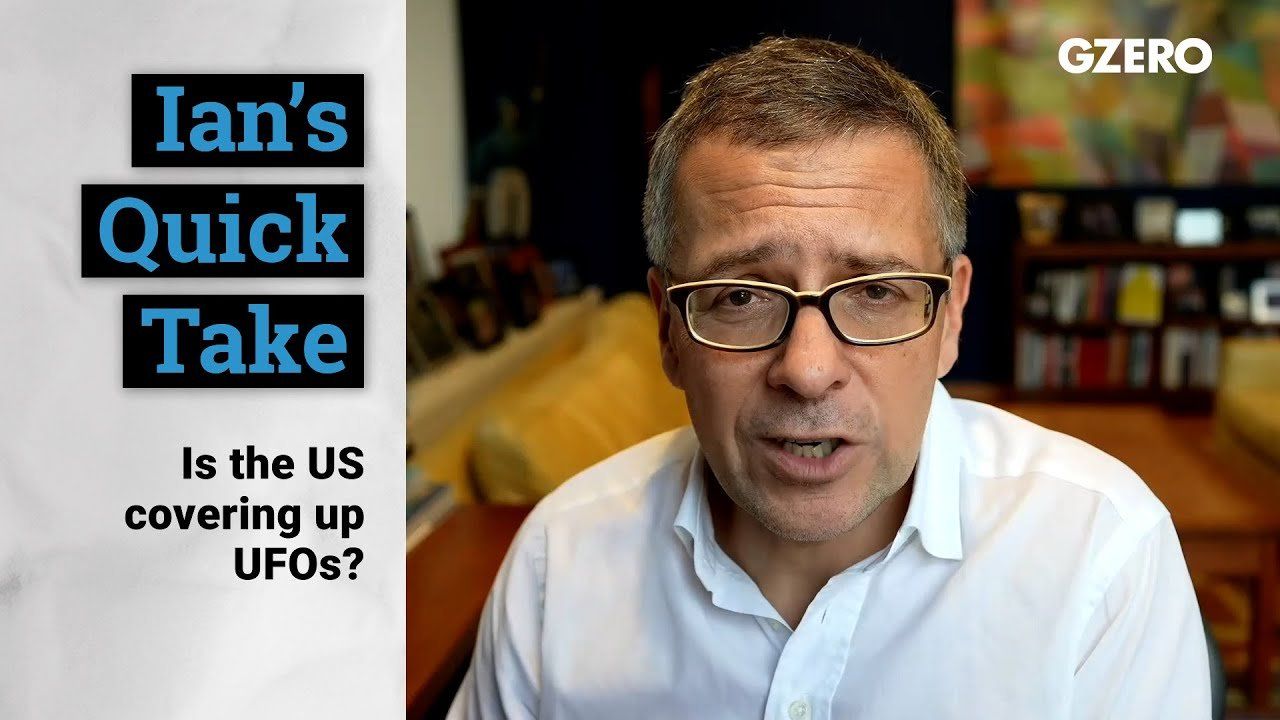July 27, 2023
Ian Bremmer's Quick Take:
Hi, everybody. Ian Bremmer here, and we're talking about aliens, a Quick Take. Very exciting, of course.
A Congressional testimony by a whistleblower, a former Air Force intelligence officer. His name is David Grusch, Major David Grusch, who says that the US government has been covering up UFOs.
David Grusch: “I like to use the term non-human, I don't like to denote origin, it keeps the aperture open.”
They come from other galaxies. We have no idea, but it's a coverup, and the fact that it's covered up is clearly evidence of an even deeper state than we had been aware of before. It's one thing when the deep state can fake your elections. It's another when they can actually cover up extraterrestrial species. And we know that, because if you look at all of the sightings of aliens that have happened over the past decades, they've mostly come over the United States, not just continental, Alaska too, a little Hawaii. But still, we should be the ones that find the real ones and then cover up the real ones if that's where the sightings are.
They're blurry. They're usually pretty blurry. And it is true that all the technologies around sensors are improving, and that's why we have great photos of Chinese surveillance balloons when they come over the United States. The UFOs are still blurry, but that's not necessarily because they don't exist. It could be because the alien technology at evading improved surveillance technology in the United States is also improving. It's not like the aliens are just going to stay still while our technology improves.
In all seriousness, I don't believe that he is telling us the truth, even though he is under oath, about the cover-up and the aliens. And Major Grusch, if it turns out that you're actually telling the truth, and this is all a big conspiratorial cover up, the lack of evidence of which is only more proof that the cover-up exists, I will apologize, in person if you like, or certainly on video, but for now I think you're full of crap.
It's good. My mother used to buy the National Enquirer at the Stop & Shop every week, and it was 15 cents, and I enjoyed reading it. It was the articles. It wasn't just the two-headed baby and the she-wolf and all of that stuff. And I learned how to BS people for money from the Enquirer. I stopped. I did not decide to take that on as a profession. You apparently have. I wish you wouldn't do that.
I do believe in aliens. I don't think we're the only intelligent life in the universe. I think it's quite likely we may be the only observable intelligent life in the universe right now, because we only have existed as intelligent life for a cosmological eye-blink. And I might not have said this 30 years ago, but when I look at the acceleration of technology and just how fast we are moving in terms of especially artificial intelligence, this does not seem sustainable. It seems very, very unlikely to me that we are around as an identifiable species in, say, a hundred years. And given that, if you assume that intelligent life is able to develop technologies anywhere in the universe, it's around, it explodes, and then it either becomes something really cool that we don't understand, or it blows itself up. And so, I suspect that the aliens that are around are in the future or in the past, or they're us, but they're not the ones that Grusch is lying about.
That's it from me, and I'll talk to you all real soon.
From Your Site Articles
More For You
TOKYO, JAPAN - FEBRUARY 8: Japan's Prime Minister Sanae Takaichi, leader of the ruling Liberal Democratic Party (LDP), places a red paper rose on the name of an elected candidate at the LDP headquarters on general election day on February 08, 2026 in Tokyo, Japan. Voters across the country headed to polls today as Japan's Lower House election was held.
Photo by Kim Kyung-Hoon - Pool/Getty Images
When Japanese Prime Minister Sanae Takaichi called snap elections last month, it was a big gamble. Holding a winter election just four months into her tenure with no real policy record to run on?
Most Popular
What's Good Wednesdays
What’s Good Wednesdays™, February 11, 2026
Sponsored posts
Football wins, local economy scores
Walmart sponsored posts
Walmart’s $1 billion investment is strengthening associate careers
Tune in on Saturday, February 14th at 12pm ET/6pm CET for the live premiere of our Global Stage from the 2026 Munich Security Conference, where our panel of experts takes aim at the latest global security challenges.
Microsoft unveiled a new set of commitments guiding its community‑first approach to AI infrastructure development. The strategy focuses on energy affordability, water efficiency, job creation, local investment, and AI‑driven skilling. As demand for digital infrastructure accelerates, the company is pushing a new model for responsible datacenter growth — one built on sustainability, economic mobility, and long‑term partnership with the communities that host it. The move signals how AI infrastructure is reshaping local economies and what people expect from the tech shaping their future. Read the full blog here.
Armed Israeli soldiers walk through an alley in the Old City of Hebron, in the occupied West Bank, on February 7, 2026. The Israeli army routinely secures routes and gathering points when settlers visit the city.
Photo by Mosab Shawer/Middle East Images/StringersHub/Sipa USA
The Israeli government unilaterally passed measures that allow Jewish settlers to purchase land in the West Bank, overriding past laws that effectively banned the sale of property there to anyone other than Palestinian residents.
© 2025 GZERO Media. All Rights Reserved | A Eurasia Group media company.
